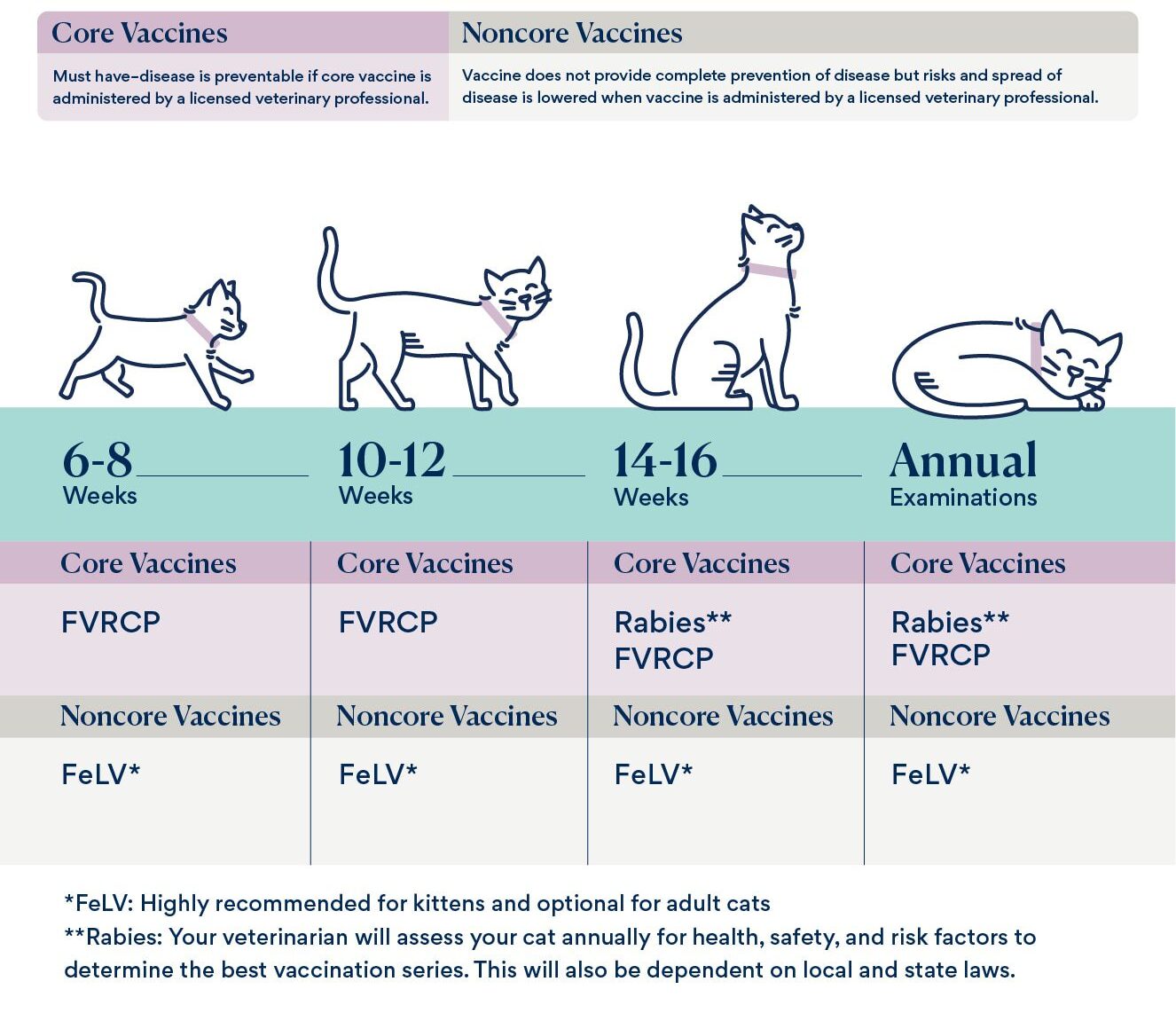Key Takeaways:
- Regular vaccination is essential for the overall health and well-being of cats.
- Core vaccines, such as those for rabies and feline distemper, are necessary for all cats regardless of their lifestyle.
- Non-core vaccines should be administered based on the cat's individual risk factors and lifestyle.
- Vaccination schedules should be customized according to the cat's age, health condition, and exposure risks.
- Consulting a veterinarian is crucial in making informed decisions about cat vaccinations to ensure maximum protection against diseases while minimizing potential risks.
Are you a cat owner who wants to ensure the health and well-being of your furry friend? If so, then delving into the world of cat vaccines is an essential journey for you. Understanding the importance of vaccinations can help protect your beloved pet from dangerous diseases and potentially save their life. In fact, did you know that vaccinated cats are 95% less likely to contract fatal illnesses? By exploring the topic of cat vaccines, you will gain valuable knowledge that can make a significant difference in your cat's overall health and happiness. So, let's embark on this enlightening adventure together and discover how to navigate the vaccination conundrum!
Why is it important to vaccinate your cat?
Vaccinating your cat is crucial for their overall health and well-being. Vaccines help protect cats from various diseases that can be harmful or even deadly. By vaccinating your cat, you are giving them a strong defense against these diseases and ensuring they have the best chance of living a long and healthy life.
Not only does vaccinating your cat protect them, but it also helps prevent the spread of diseases to other cats in the community. Vaccines work by stimulating the immune system to produce antibodies that fight off specific diseases. This means that if your cat comes into contact with a disease they have been vaccinated against, their body will already be prepared to fight it off.
Benefits of vaccinating your cat:
- Prevents serious illnesses
- Protects other cats in the community
- Gives peace of mind knowing your cat is protected
- Saves money on potential vet bills for treating preventable diseases
Vaccines commonly recommended for cats:
- Rabies vaccine
- Feline distemper vaccine (FVRCP)
- Feline leukemia vaccine (FeLV)
Note:
It's important to consult with your veterinarian to determine which vaccines are necessary for your specific cat based on their lifestyle and risk factors.
Common diseases that cat vaccines can prevent
One of the main reasons to vaccinate your cat is to protect them from common diseases. Vaccines work by stimulating your cat's immune system to recognize and fight off specific viruses or bacteria. Some of the diseases that cat vaccines can prevent include:
- Feline Panleukopenia (FPV): Also known as feline distemper, FPV is a highly contagious viral disease that affects a cat's gastrointestinal tract, bone marrow, and immune system. It can be fatal, especially in kittens.
- Feline Viral Rhinotracheitis (FVR): This is a respiratory infection caused by the feline herpesvirus. It can cause sneezing, nasal discharge, fever, and eye inflammation.
- Feline Calicivirus (FCV): FCV is another common respiratory infection in cats. It causes symptoms similar to FVR and can also lead to mouth ulcers.
- Rabies: Rabies is a deadly viral disease that affects the nervous system of mammals, including cats. It can be transmitted through bites from infected animals.
How do vaccines work in a cat's body?
Vaccines help prepare a cat's immune system to fight against specific diseases. When a vaccine is administered, it contains either weakened or killed forms of the virus or bacteria it aims to protect against. These harmless versions of the pathogens stimulate an immune response without causing illness.
The cat's immune system recognizes these foreign substances as potential threats and produces antibodies to attack them. Antibodies are proteins that neutralize or destroy harmful pathogens. If the vaccinated cat later encounters the actual disease-causing virus or bacteria, their immune system will recognize it and respond rapidly, preventing or minimizing the severity of the infection.
When should you start vaccinating your kitten?
Vaccinating kittens is crucial to protect them from diseases early in life. The first round of vaccinations typically begins when a kitten is around 6 to 8 weeks old. The initial vaccines are usually given in a series over several weeks to ensure optimal protection.
The core vaccines for kittens include those for feline panleukopenia, feline viral rhinotracheitis, and feline calicivirus. Additionally, depending on the region and lifestyle factors, your veterinarian may recommend other non-core vaccines such as those for feline leukemia virus (FeLV) or feline immunodeficiency virus (FIV).
Potential side effects of cat vaccinations
While cat vaccinations are generally safe and well-tolerated, there can be potential side effects. Most side effects are mild and temporary, such as soreness at the injection site or mild fever. However, more serious reactions are rare but possible.
Some cats may experience allergic reactions to certain vaccine components. Signs of an allergic reaction include difficulty breathing, facial swelling, hives, vomiting, or diarrhea. If you notice any concerning symptoms after vaccination, it's important to contact your veterinarian immediately.
Risks of not vaccinating your cat
Choosing not to vaccinate your cat can expose them to various risks. Without proper vaccination protection, cats are vulnerable to potentially deadly diseases that could have been prevented.
Unvaccinated cats can easily contract contagious diseases from other infected animals they come into contact with. This is particularly true if your cat spends time outdoors or interacts with other cats in multi-cat households or communal areas. Additionally, some diseases, such as rabies, can also pose a risk to human health.
How often should you bring your cat for vaccine boosters?
Vaccine boosters are necessary to maintain a cat's immunity against diseases over time. The frequency of booster shots depends on various factors, including the specific vaccine used and the cat's lifestyle.
For most core vaccines, cats typically receive booster shots every 1 to 3 years. Non-core vaccines may have different schedules, and your veterinarian will advise you on the appropriate timing for each vaccine.
Benefits of vaccinating indoor cats
Vaccinating indoor cats is equally important as outdoor cats. Even though indoor cats have limited exposure to potential disease carriers compared to outdoor cats, they can still be at risk.
Indoor cats can escape from the house accidentally or come into contact with other animals that may carry diseases. Additionally, if you ever need to board your cat or take them to a veterinary clinic, vaccination records are often required for their safety and the safety of other animals in those environments.
In conclusion, cat vaccines are important to protect our furry friends from harmful diseases. While there may be different opinions on vaccination, consulting with a veterinarian can help owners make the best decision for their cats' health.
Why is it crucial to vaccinate your cat?
According to a veterinarian from Texas A&M University, vaccines are crucial for both indoor and outdoor cats to prevent diseases caused by viruses or bacteria. Whether they live inside or outside, kittens and cats can come into contact with these disease-causing agents.
At what age do you stop vaccinating your cat?
If your cat is over 8 to 10 years old, it is recommended to talk to your veterinarian about annual revaccination. Currently, there is no universally agreed upon standard for this. Some veterinarians may choose to spread out booster immunizations over a few years.
Do cats really need feline leukemia vaccine?
While the FeLV vaccine is not necessary for all adult indoor cats, it is strongly recommended for cats that go outdoors. Your veterinarian can provide more information on the advantages and disadvantages of vaccinating your cat against this disease, taking into consideration their specific lifestyle and likelihood of exposure.
Can you over vaccinate a cat?
Over-vaccination can lead to the development of various diseases. Some pets have suffered from neurological disorders, weakened immune systems, and other health issues as a result of receiving excessive vaccinations.
What if I don't want to vaccinate my cat?
These tiny invaders infiltrate your household and target your pets. If you fail to safeguard your pets with vaccines, you are endangering them to potential diseases. Without activated antibodies to combat infections, they will deteriorate without any means of defense. Tragically, this often leads to fatal outcomes.
What happens if I dont give my cat shots?
Panleukopenia, also referred to as feline parvovirus or feline distemper, is a highly contagious viral disease that poses a significant risk to unvaccinated cats. It spreads rapidly within cat communities and can be life-threatening. This illness targets cells that divide rapidly in the body and can lead to symptoms such as vomiting, diarrhea, and neurological issues.
















